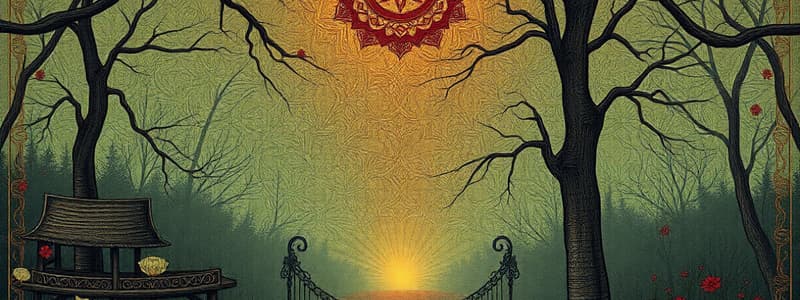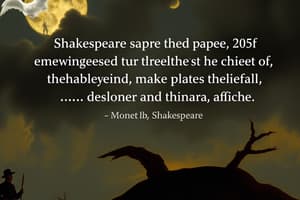Podcast
Questions and Answers
What theme does the quote 'Fair is foul, and foul is fair' relate to?
What theme does the quote 'Fair is foul, and foul is fair' relate to?
- Ambition
- The nature of tragedy
- Manliness / masculine and feminine
- Deception / truth and lies (correct)
Which of the following quotes represents Macbeth’s internal conflict about manhood?
Which of the following quotes represents Macbeth’s internal conflict about manhood?
- 'Tis safer to be that which we destroy than by destruction dwell in doubtful joy.
- What hands are here! Ha, they pluck out mine eyes.
- Life’s but a walking shadow, a poor player.
- I dare do all that may become a man; Who dares do more is none. (correct)
What does the quote 'Naught's had, all's spent' imply about Macbeth's state of mind?
What does the quote 'Naught's had, all's spent' imply about Macbeth's state of mind?
- He believes his efforts have been futile. (correct)
- He is optimistic about the future.
- He reflects on his lost ambition.
- He feels content with his achievements.
In which way does the quote 'Come, you spirits that tend on mortal thoughts' reflect Macbeth’s character development?
In which way does the quote 'Come, you spirits that tend on mortal thoughts' reflect Macbeth’s character development?
The phrase 'Out, damned spot; out, I say' illustrates which theme most clearly?
The phrase 'Out, damned spot; out, I say' illustrates which theme most clearly?
Which statement best describes the significance of the blood imagery in Macbeth?
Which statement best describes the significance of the blood imagery in Macbeth?
What does the quote 'All our yesterdays have lighted fools the way to dusty death' suggest about life?
What does the quote 'All our yesterdays have lighted fools the way to dusty death' suggest about life?
Which theme is represented by the repeated idea of 'darkness' and 'light' in the play?
Which theme is represented by the repeated idea of 'darkness' and 'light' in the play?
Flashcards
Macbeth
Macbeth
The protagonist of Shakespeare's tragedy Macbeth, Macbeth is a Scottish general who is driven by ambition and a desire for power. He is initially a valiant and loyal soldier but succumbs to the temptation of the witches' prophecies and murders King Duncan, setting in motion a chain of events that leads to his own downfall.
Is Macbeth a tragic hero?
Is Macbeth a tragic hero?
Macbeth is a tragic hero, a character who experiences a downfall due to his own flaws and weaknesses. He is initially a noble and courageous warrior, but his ambition and desire for power ultimately lead to his demise. The witches' prophecies play a significant role in influencing his actions and ultimately contributing to his downfall. Macbeth is a complex character, demonstrating traits of courage, ambition, ambition, guilt, and despair.
Ambition
Ambition
A major theme in Macbeth is ambition, not just personal ambition, but a relentless desire for power that can lead to tyranny and ultimately, self-destruction. Macbeth's ambition takes hold after the witches' prophecy and fuels his actions leading to the murder of King Duncan. This theme highlights the dangers of unchecked ambition and its corrosive effect on individuals.
Masculinity and Femininity
Masculinity and Femininity
Signup and view all the flashcards
Deception and Truth
Deception and Truth
Signup and view all the flashcards
The Tragedy of Macbeth
The Tragedy of Macbeth
Signup and view all the flashcards
Fate and the Supernatural
Fate and the Supernatural
Signup and view all the flashcards
Macbeth's Character Change
Macbeth's Character Change
Signup and view all the flashcards




